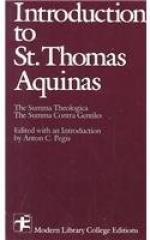
|
| Name: _________________________ | Period: ___________________ |
This test consists of 15 multiple choice questions and 5 short answer questions.
Multiple Choice Questions
1. In Question 85: The Mode and Order of Understanding, the thing is understood and then there is the fact that ____________.
(a) It is understood.
(b) It should be understood.
(c) The thing exists.
(d) Understanding is impossible.
2. Aquinas claims that _________________ observes, categorizes, and determines what would be harmful and what would be helpful to an entity, person, or organism.
(a) The essence of power.
(b) The prelapsarian power.
(c) The concupiscible power.
(d) The irascible power.
3. Aquinas also believes that humans do perceive the same principles when they use_______________ thought.
(a) True and false.
(b) Abstract and concrete.
(c) Abstract and conceptual.
(d) Real and imagined.
4. God cannot be the end of things as though He were something effected, but only as ______________.
(a) Something to be challenge.
(b) Something to be altered.
(c) Something to be created.
(d) Something already existing and to be acquired.
5. An intellect knows multiple things by their difference and can compare them ______________.
(a) Carefully.
(b) From others' experiences.
(c) From direct experience.
(d) From afar.
6. At its best, An Introduction to Saint Thomas Aquinas clarifies the mind, provides instruction and insight. It displays the vigorous efforts made by ___________ to come to terms with two of the top Grecian philosophers.
(a) All Christians.
(b) Muslims.
(c) The Catholic religion.
(d) The religious.
7. Aquinas goes back to pre-Socratic times and the observation that the system is rooted in motion, which ___________ certainty.
(a) Undermines.
(b) Supports.
(c) Is similar to.
(d) Benefits.
8. How many objections and replies exist in the Fourth Article: Whether Choice is of Those Things Only That are Done By Us?
(a) Eight.
(b) Three.
(c) Four.
(d) Two.
9. The matter of whether the essence of the soul is its power involves whether ____________________ soul are separate and distinct or not.
(a) The sensitive and the rational.
(b) The intellectual and spiritual.
(c) The concrete and abstract.
(d) The irrational and rational.
10. The Second Article concerns whether the intellect is a purely _________ power or not.
(a) Aggresive.
(b) Deadly.
(c) Strong.
(d) Passive.
11. Aquinas discusses agents and ____________.
(a) Reaction.
(b) Actions.
(c) Agents.
(d) Reagents.
12. In Chapter 19-21, the format resumes the structure of the questions with what?
(a) Answers.
(b) Rebuttals.
(c) Objections.
(d) Objections, answers, and rebuttals.
13. How many objections does Aquinas write in regards to whether the essence of the soul is its power?
(a) None.
(b) Seven.
(c) Six.
(d) Five.
14. The distinction between two things is a subdivision of ___________ of a whole.
(a) Understanding.
(b) Knowledge.
(c) What is to be understood.
(d) These things.
15. The Fourth Article is Whether We Can Understand Many Things at the Same Time. What does Aquinas say that the ability to distinguish two things involves?
(a) Having two things.
(b) Having intellect.
(c) Knowing their difference.
(d) Having two different things.
Short Answer Questions
1. What does Aquinas differentiate between in the First Article?
2. Who does Aquinas mention in the Third Article, when he asks if there is an Agent Intellect?
3. While still part of The Summa Theologica, chapters 19-21 are an entirely ___________ part.
4. The Second Article is more intimately connected with Church doctrine: separating irascible from _____________.
5. How many articles are there for Question XVIII: On the Goodness and Malice of Human Acts in General?
|
This section contains 517 words (approx. 2 pages at 300 words per page) |

|




